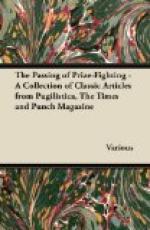The gardener says, I ought to add,
The centipede is not so bad;
He rather likes
the brutes.
The millipede is what he loathes;
He uses fierce bucolic oaths
Because it eats
his roots;
And every gardener is agreed
That, if you see a centipede
Conversing with
a milli—,
On one of them you drop a stone,
The other one you leave alone—
I think that’s
rather silly.
They may be right, but what I say
Is, “Can one stand about all day
And count
the creature’s legs?”
It has too many, any way,
And any moment it may lay
Another hundred
eggs;
So if I see a thing like this (1)
I murmur, “Without prejudice,”
And knock it on
the head;
And if I see a thing like that (2)
I take a brick and squash it flat;
In either case
it’s dead.
A.P.H.
(1) and (2). There ought to be two pictures here, one with a hundred legs and the other with about a thousand. I have tried several artists, but most of them couldn’t even get a hundred on to the page, and those who did always had more legs on one side than the other, which is quite wrong. So I have had to dispense with the pictures.
* * * * *
ANOTHER IMPENDING APOLOGY.
“Ainsi parla l’editeur
du Daily Herald. Lord Lansbury a toujours
ete
l’enfant cheri et terrible
du parti travailliste anglais.”—Gazette
de
Lausanne.
* * * * *
“WANTED.
Small nicely furnished house,
nice locality, for nearly married couple,
from August 1st.”—Johannesburg
Star.
We trust that no one encouraged them with accommodation.
* * * * *
[Illustration: THE MAKING OF A REFORMER.
SHOWING THE INFECTIOUS INFLUENCE OF ORATORY.]
* * * * *
THE MUDFORD BLIGHT.
Mary settled her shoulders against the mantel-piece, slid her hands into her pockets and looked down at her mother with faint apprehension in her eyes.
“I want,” she remarked, “to go to London.”
Mrs. Martin rustled the newspaper uneasily to an accompanying glitter of diamond rings. Mary’s direct action slightly discomposed her, but she replied amiably. “Well, dear, your Aunt Laura has just asked you to Wimbledon for a fortnight in the Autumn.”
Mary did not move. “I want,” she
continued abstractedly, “to live in
London.”
Mrs. Martin glanced up at her daughter as if discrediting the authorship of this remark. “I don’t know what you are thinking of, child,” she said tartly, “but you appear to me to be talking nonsense. Your father and I have no idea of leaving Mudford at present.”
“I want,” Mary went on in the even tone of one hypnotised by a foregone conclusion, “to go and live with Jennifer and write—things.”




